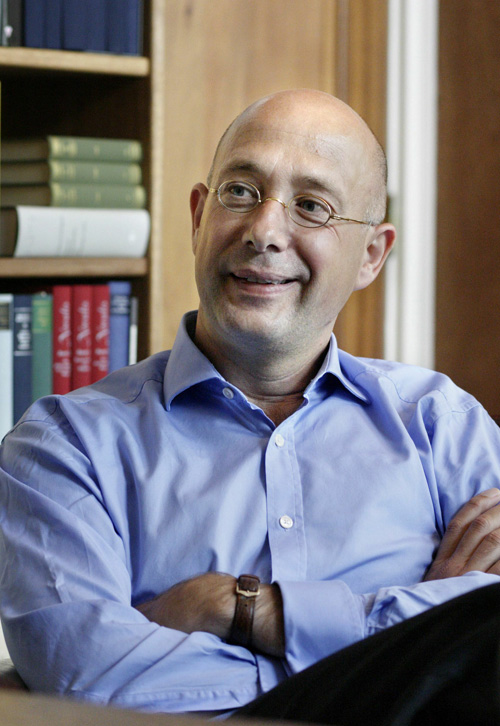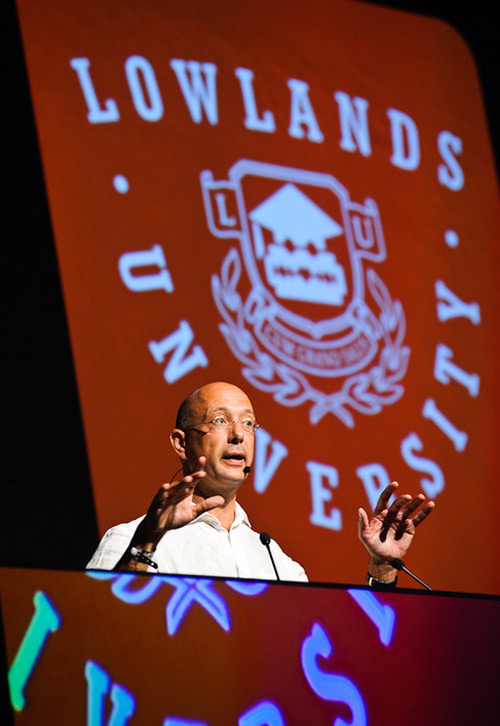“When I was a student I had the privilege to interview Harry Mulisch. One of the things I asked him in the context of a conversation on the Second World War and literature was, ‘What good does literature? What knowledge does it have to offer?’ The writer’s answer: ‘Political and historical scholarship is good for knowing the facts: who did what, what happened when. But if you really want to understand what fascism is, how things got that far, you need read Thomas Mann’s Doctor Faustus.”
Mulish was certain that, to gain insight into the human soul, as well as in social and political issues, you need to read the books of Dostojevki, Tolstoi, Shakespeare, Musil, Broch, Mann, Vargas Llosa, Marquez. These authors can help us in our search for truth.
Nexus Institute
In cooperation with his dear friend Johan Polak, who magnanimously shared his valuable experience in publishing, Riemen launched the Dutch journal Nexus in 1991. To both, the relevance of a new magazine is obvious: Nexus is to serve the European culture, the European ideal of civilization. The thematically connected essays are written by both famous and upcoming international authors. Or as Riemen puts it:
“A journal with this era in mind but not of this time; societally relevant but not political; with space for the religious and philosophical questions but not a journal of religion or philosophy; its quality intellectual, but accessible.”
Alongside Nexus as a platform for the written word, Riemen widens the possibilities when in 1994 he establishes the Nexus Institute to make way for the spoken word. The Nexus Institute brings together the world’s foremost intellectuals, artists and politicians to think and talk about the questions that really matter. How are we to live? How can we shape our future? Can we learn from our past? Which values and ideas are important, and what are they based on? Speakers included Sonia Gandhi, Michael Ignatieff, Mario Vargas Llosa, George Steiner, Francis Fukuyama, Richard Dawkins, John Coetzee, Susan Sontag, Richard Rorty and Jürgen Habermas.
Publications
In 2008, Yale University Press publishes Rob Riemen’s first book Nobility of Spirit. A forgotten Ideal. It is well received in The Guardian and The Wall Street Journal. The plea for the revival of classical humanist values is translated worldwide and has readers in Europe, the United States, South America, Russia and Asia.
In The University of Life, published in Dutch in 2013, Rob Riemen has conversations with nineteen friends from Europe, America and the Middle East, all past the age of 65. They are publishers, musicians, writers, philosophers and scientists; they are people with an intellectual, political or artistic passion. Each of them has been on a long and eventful journey through life. The important question central to these conversations: what has life taught you?
In 2018 To Figh Against This Age was published: a book combining two urgent essays about the rise of fascism and the ways in which we can combat it. The book received laudatory reviews in The New York Times and the Financial Times. It quickly became an international bestseller, with translations in Spanish, Catalan, Turkish and Korean.
Lectures
Rob Riemen receives invitations for lectures worldwide. Just a small selection: he spoke at the Lowlands Festival in The Netherlands; the Mário Soares Foundation in Portugal; the Karolinska Institute in Sweden; the Johns Hopkins University in Shanghai; Tsinghua University in Beijing; The National Council for Culture and the Arts and UNAM in Mexico; Bard College in New York; the University of California; Yale University; The Aspen Institute in Colorado; Bibliotheca Alexandrina in Egypt; Maison du Futur in Lebanon; Instituto Technologico Mexico; Business School ESADE Barcelona; and FUSADES think tank in El Salvador.





